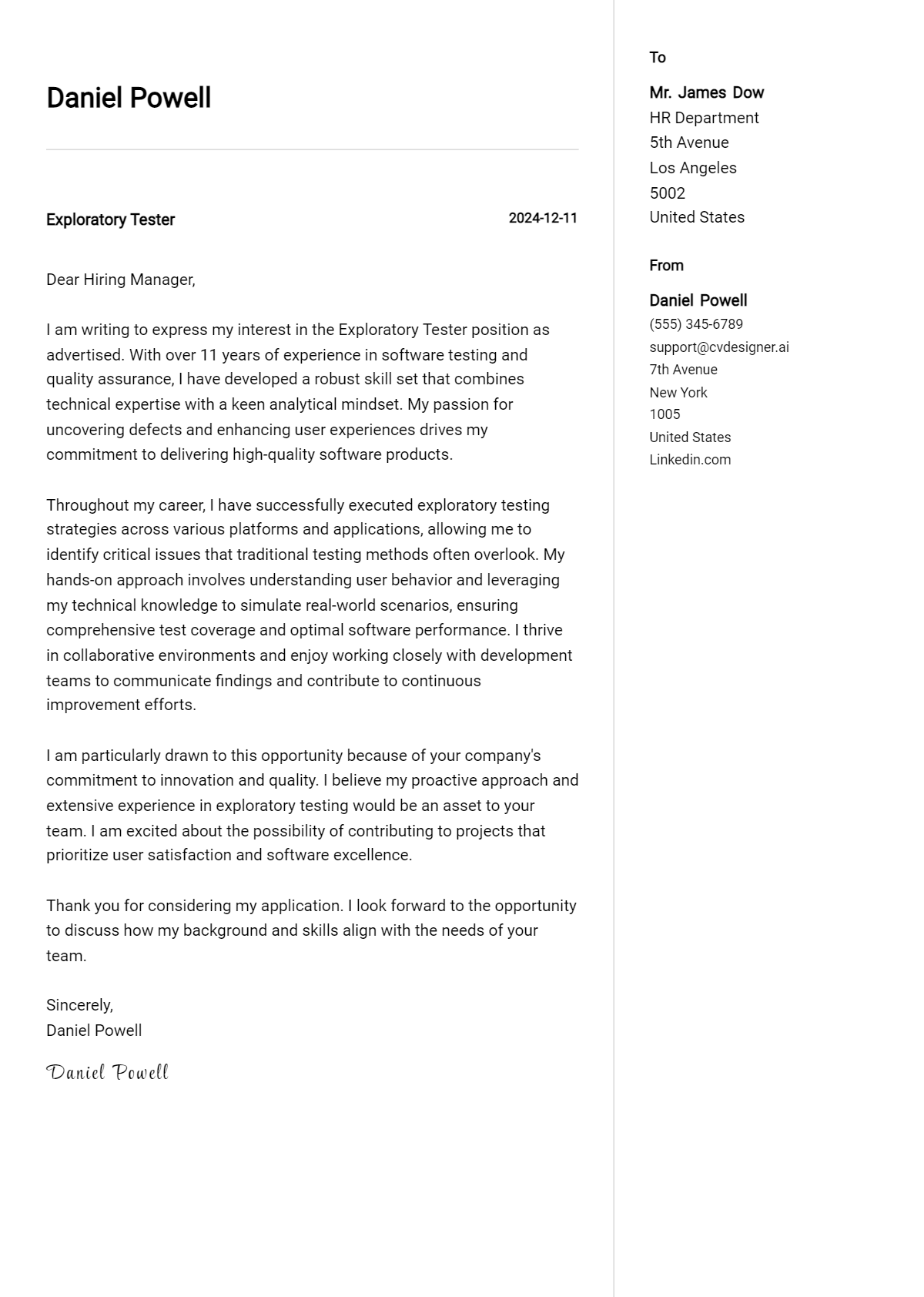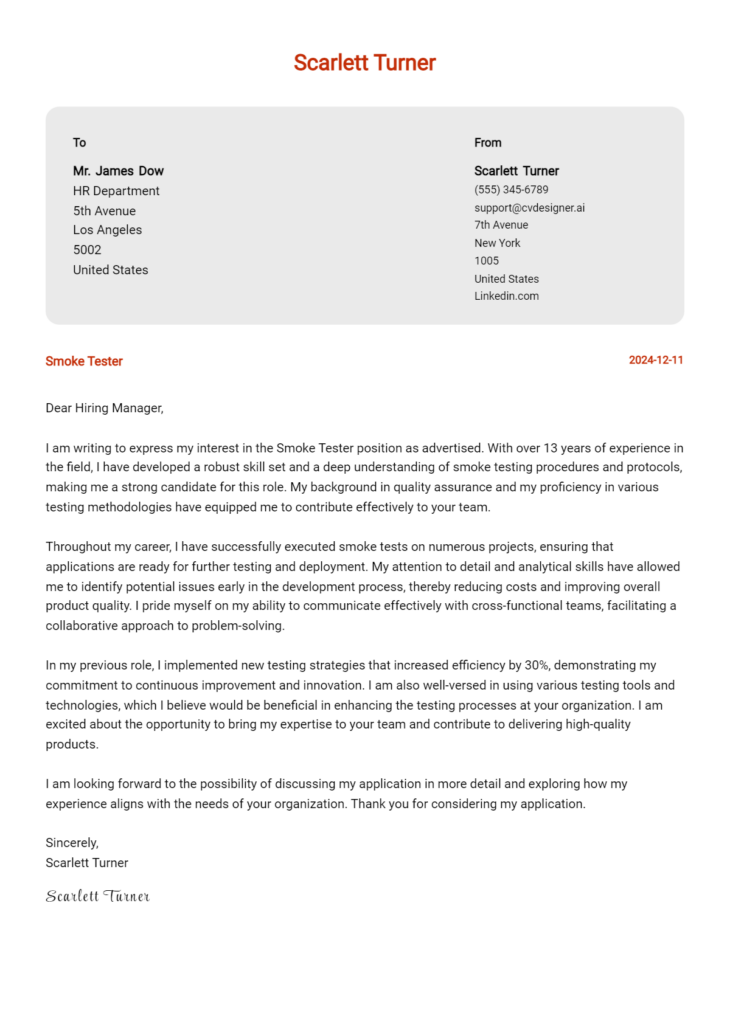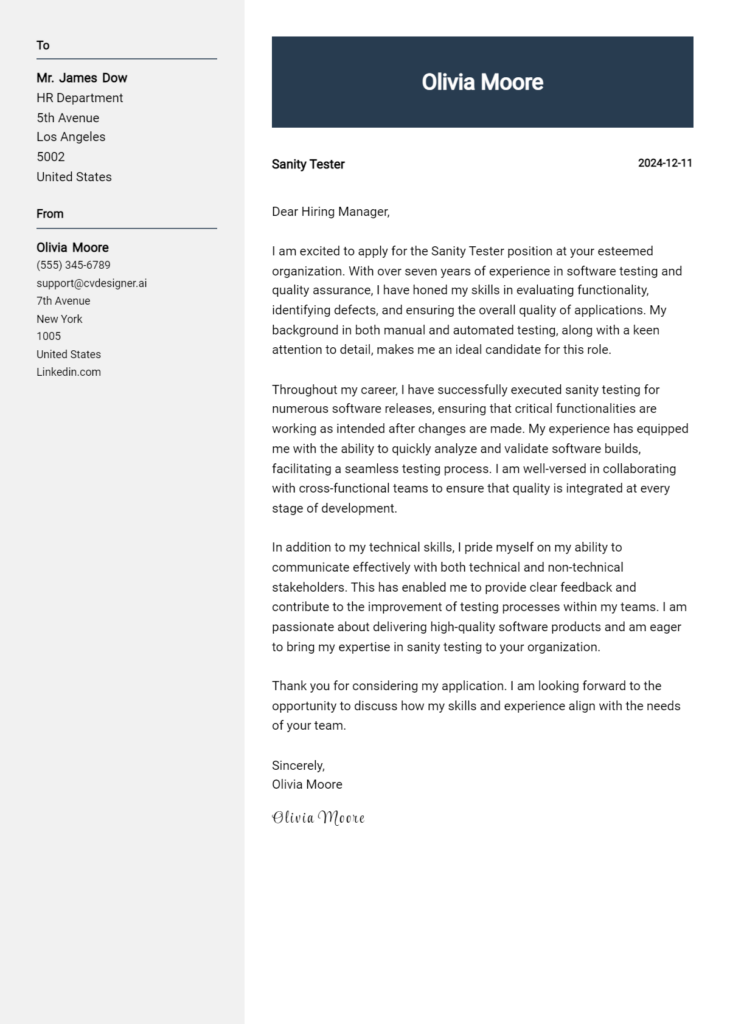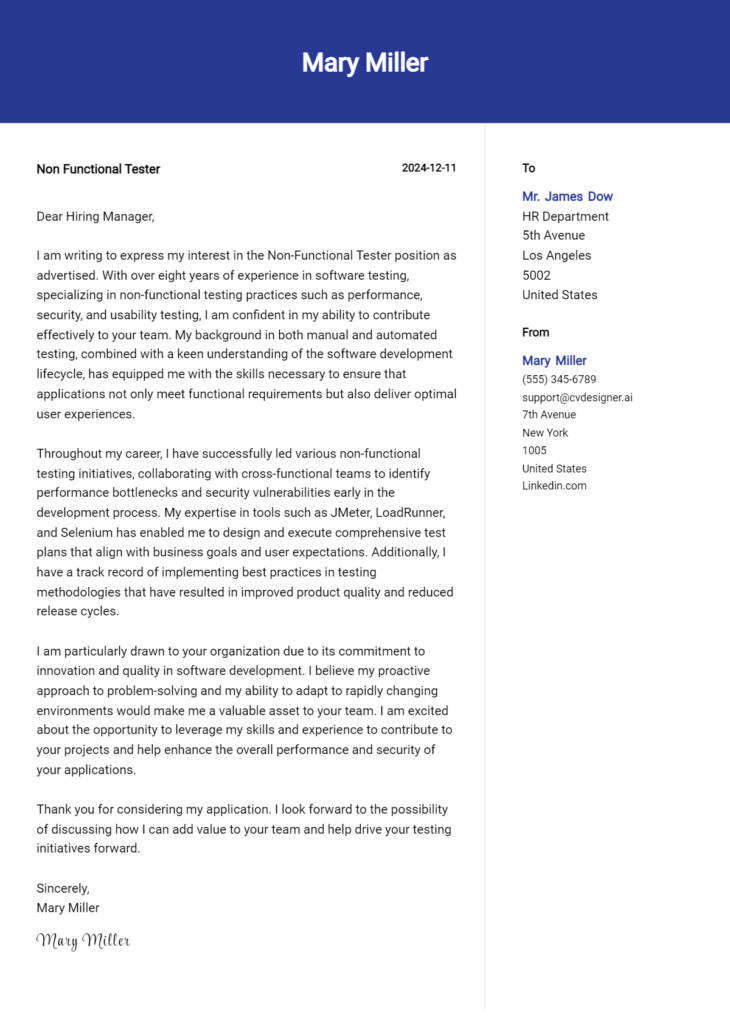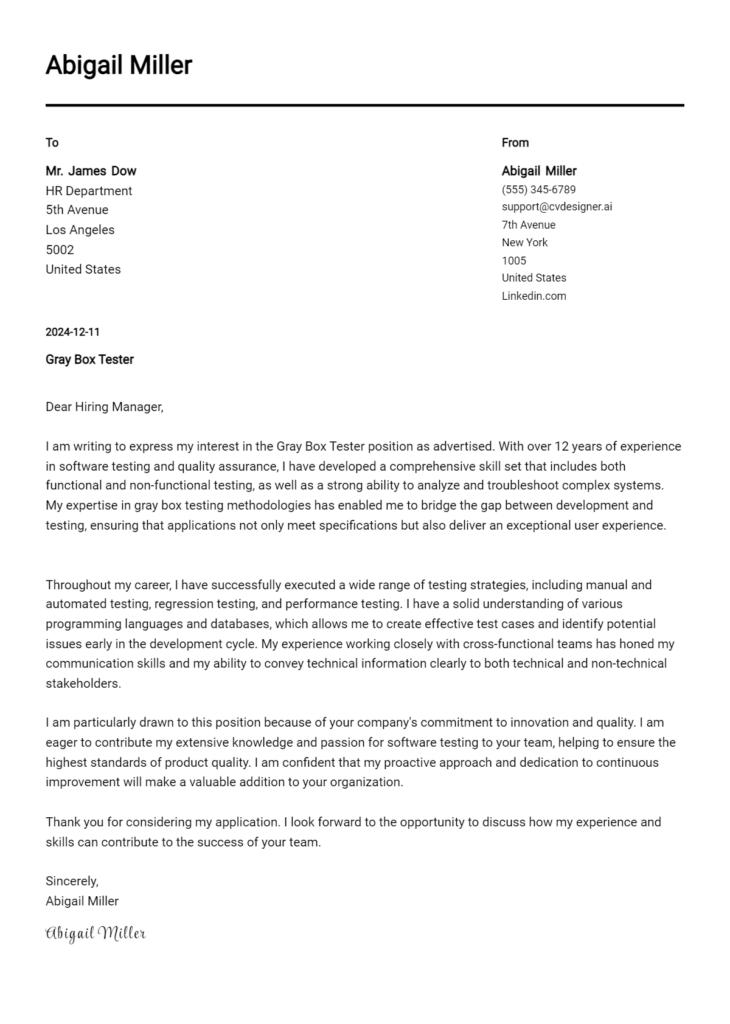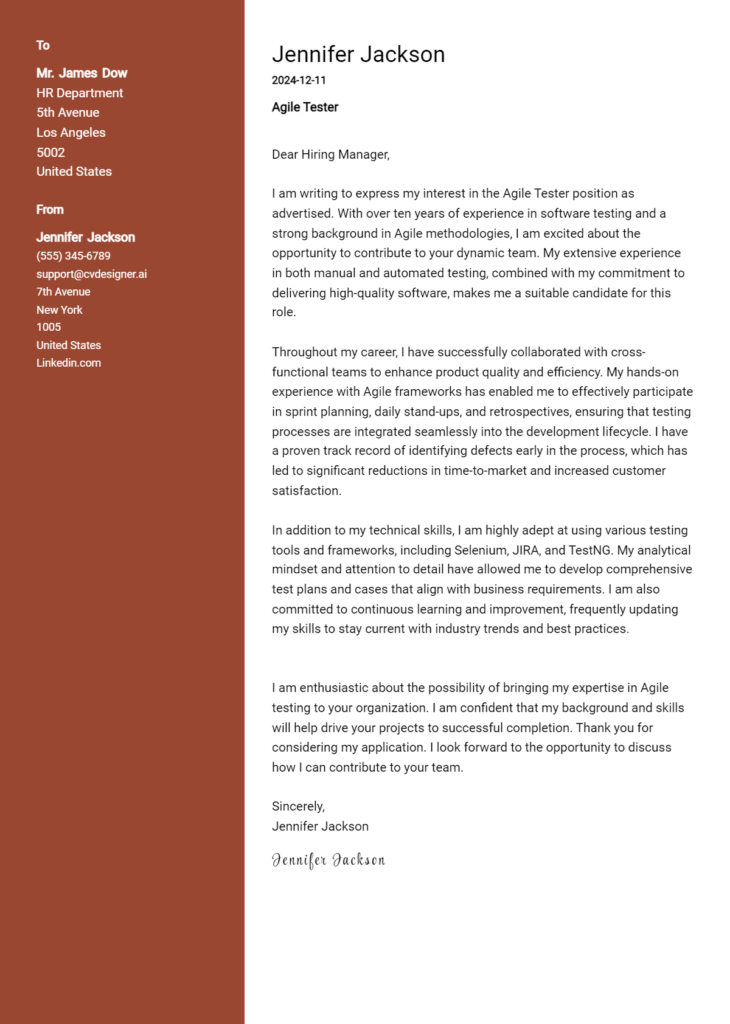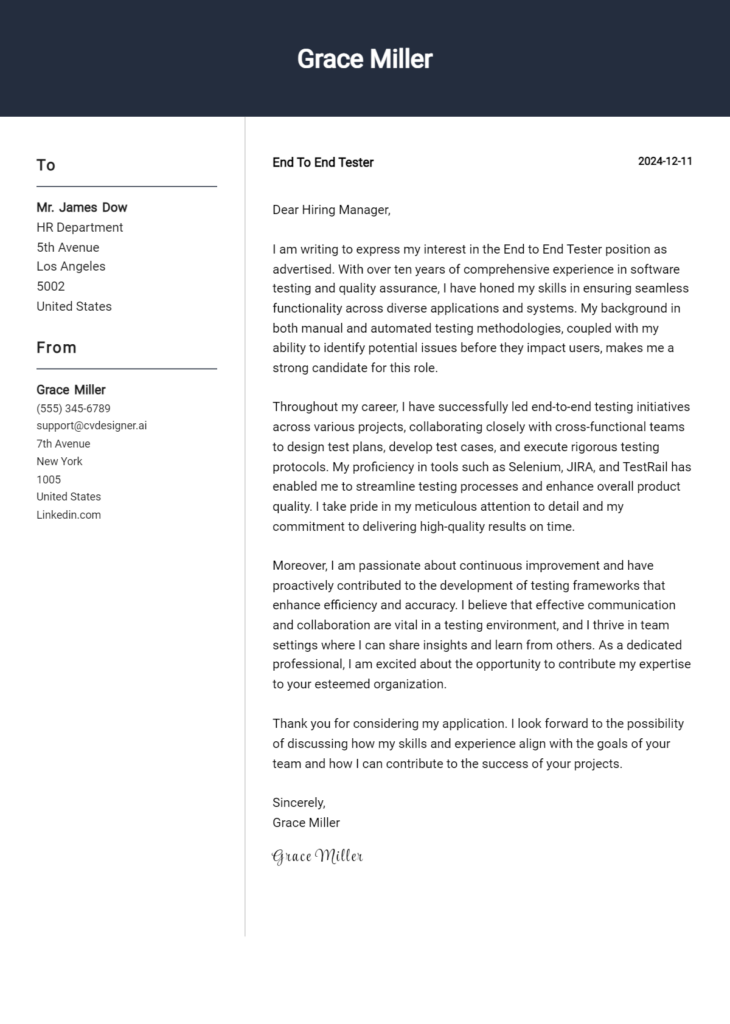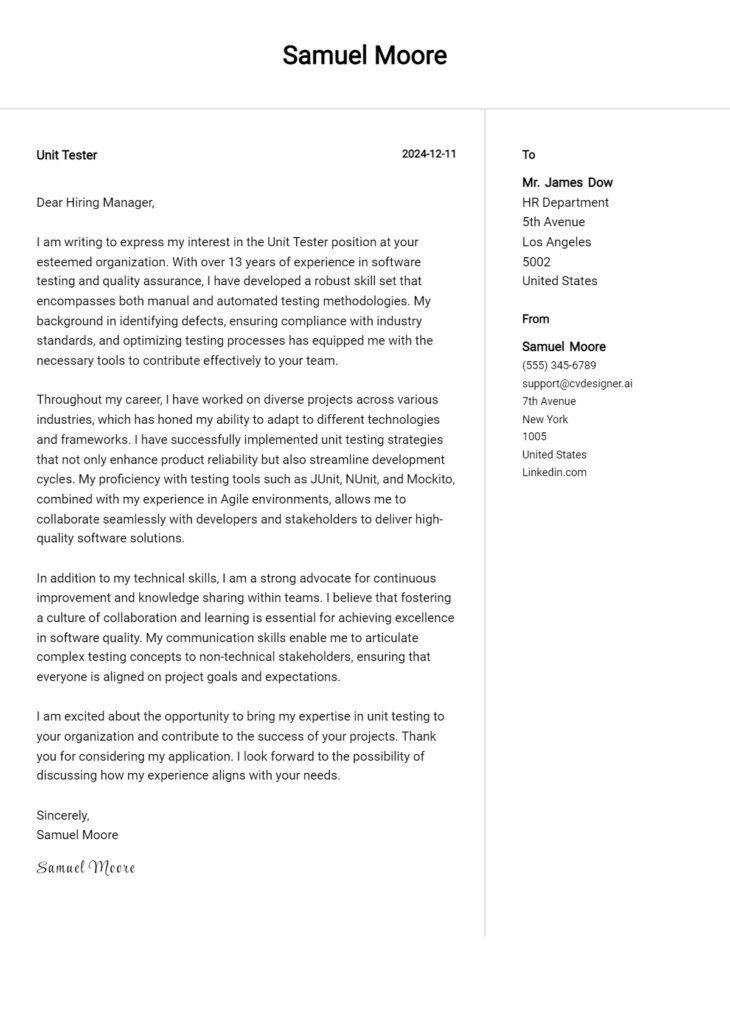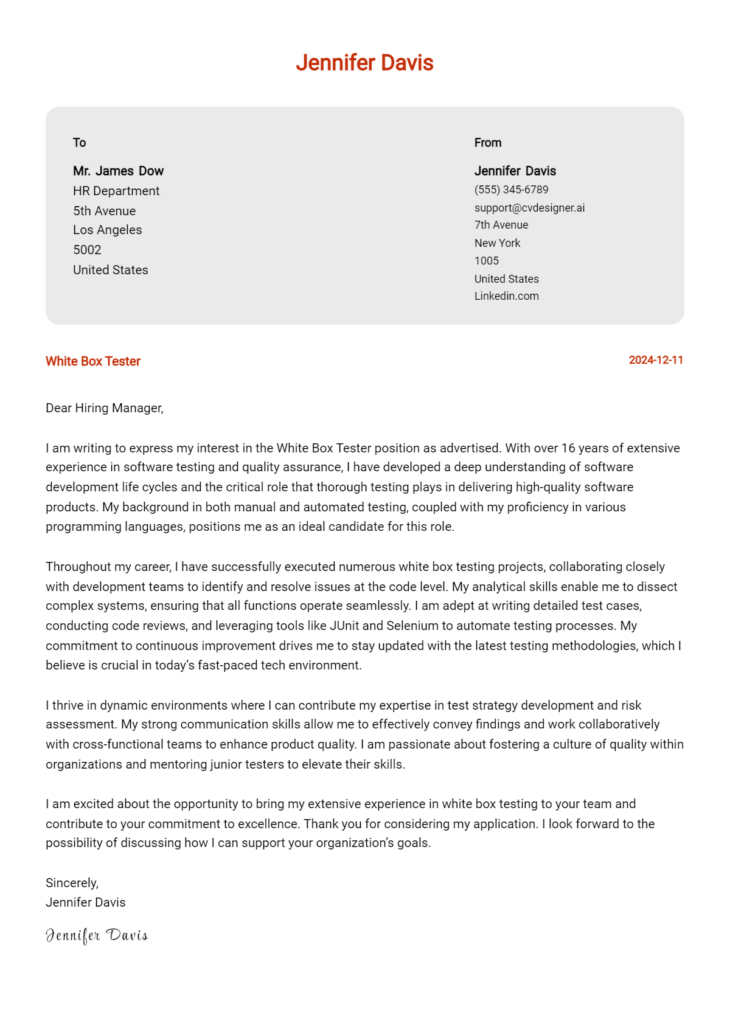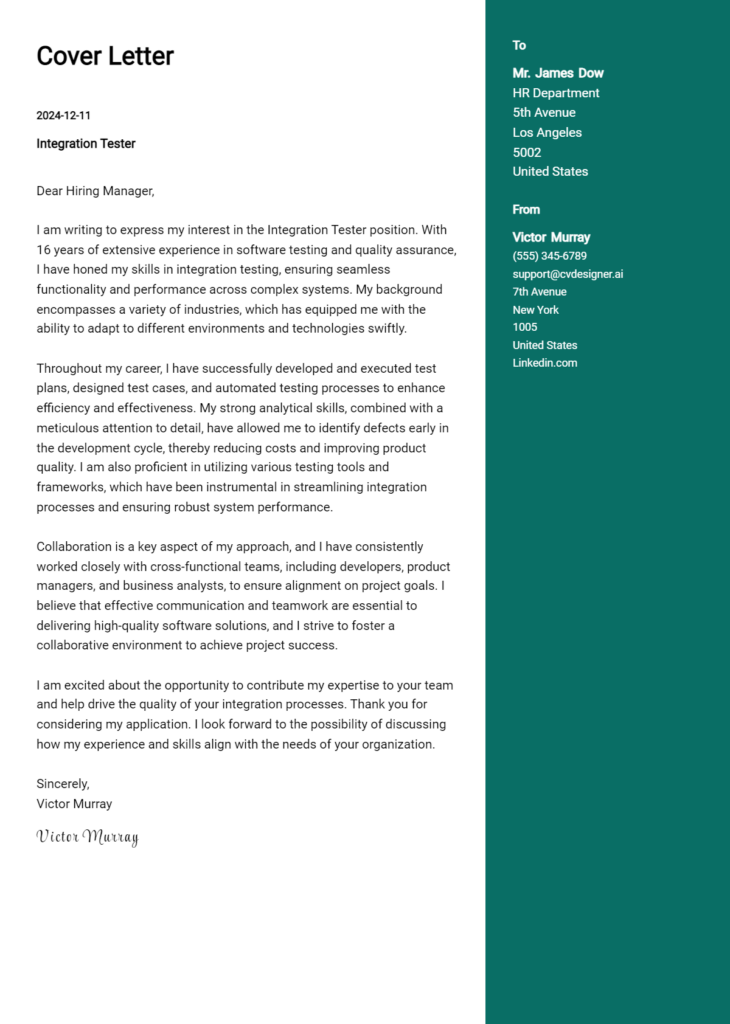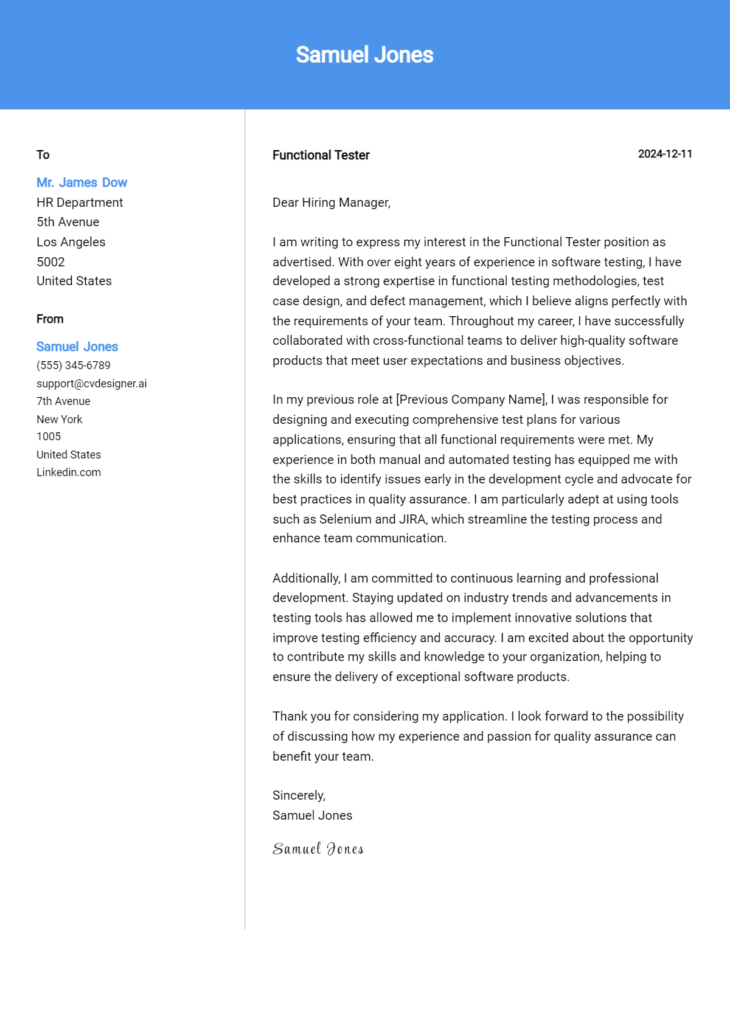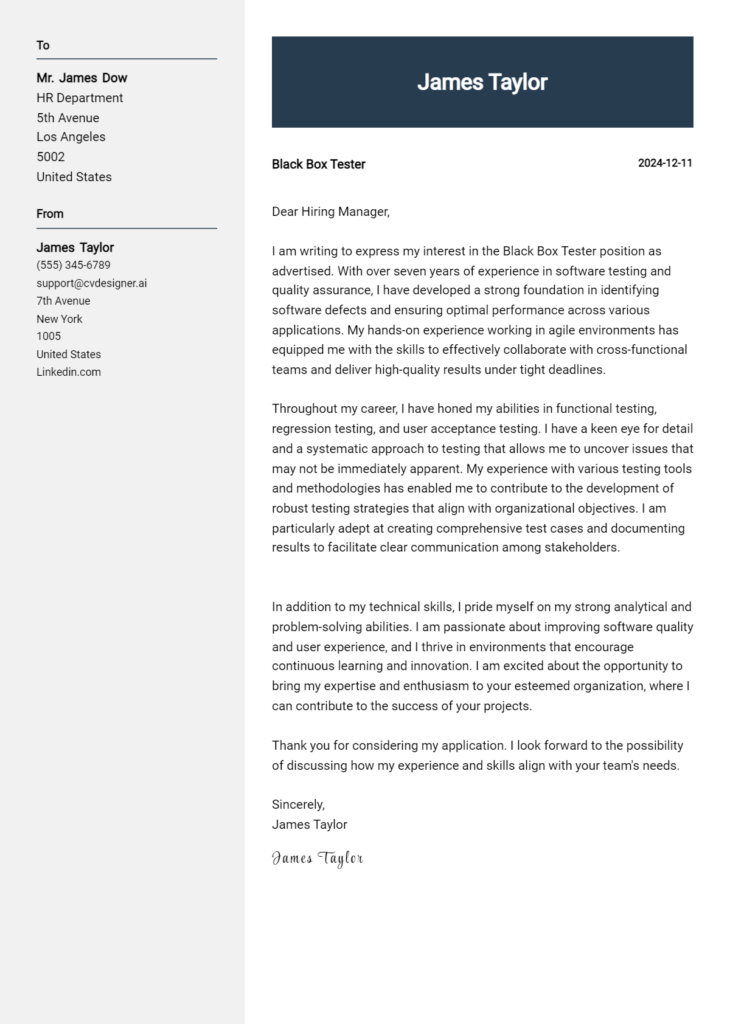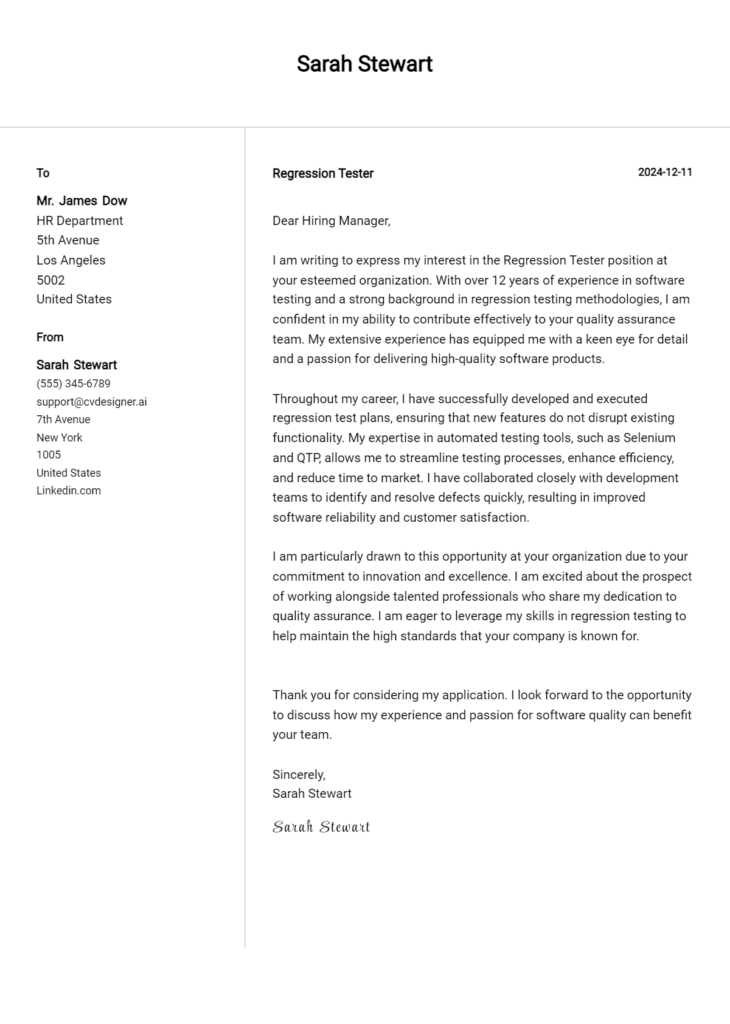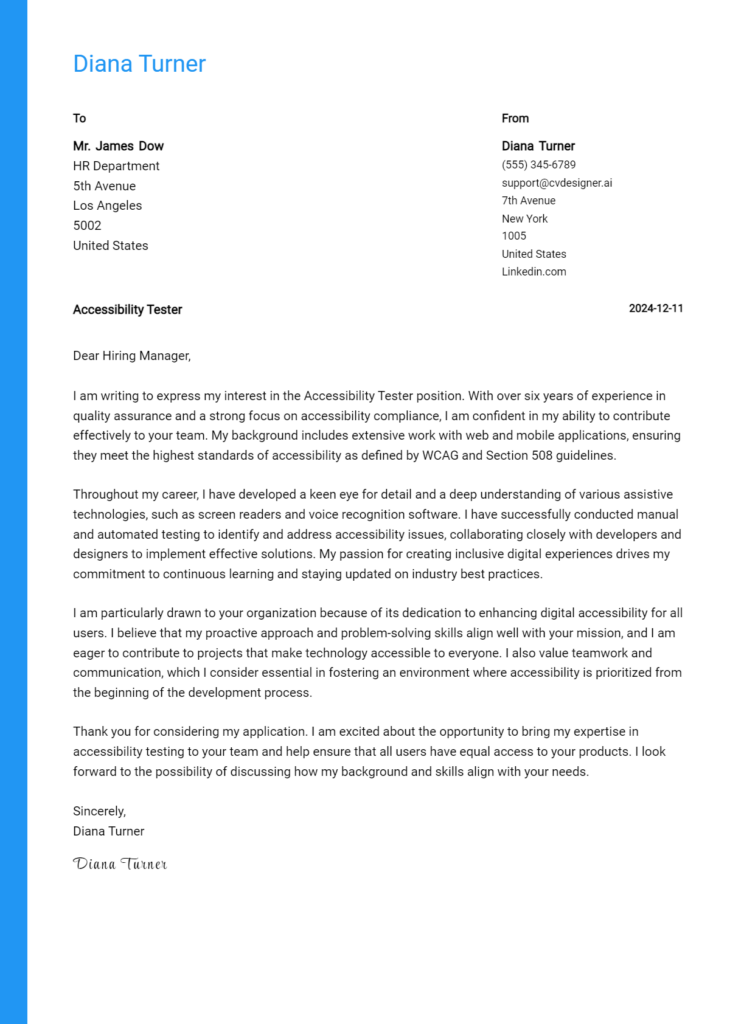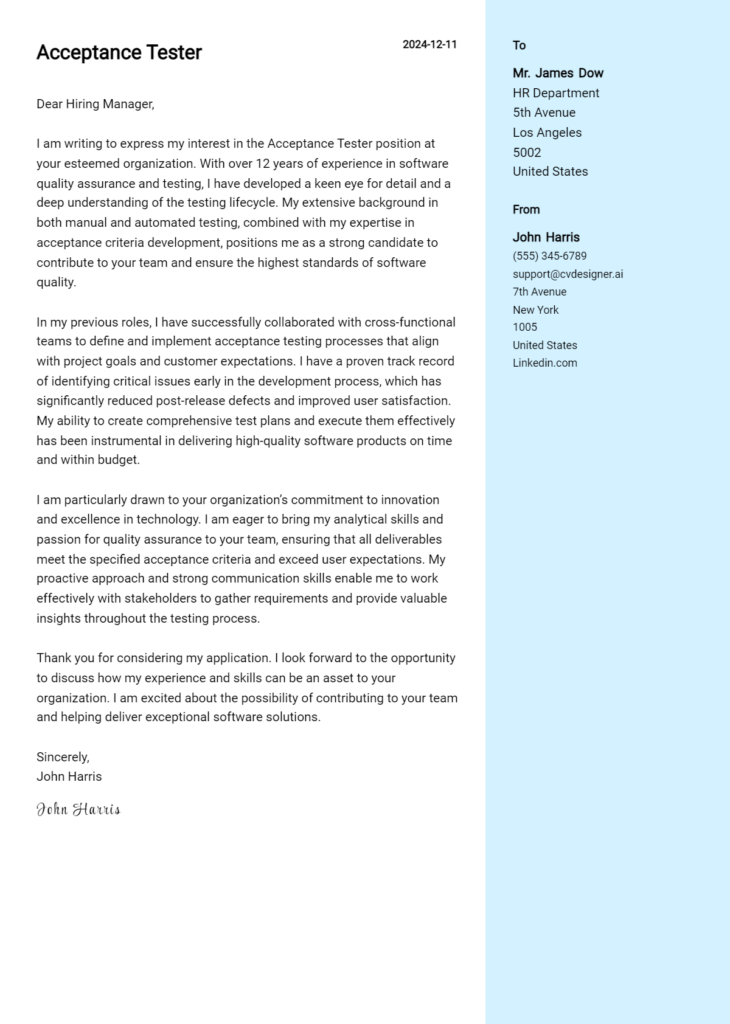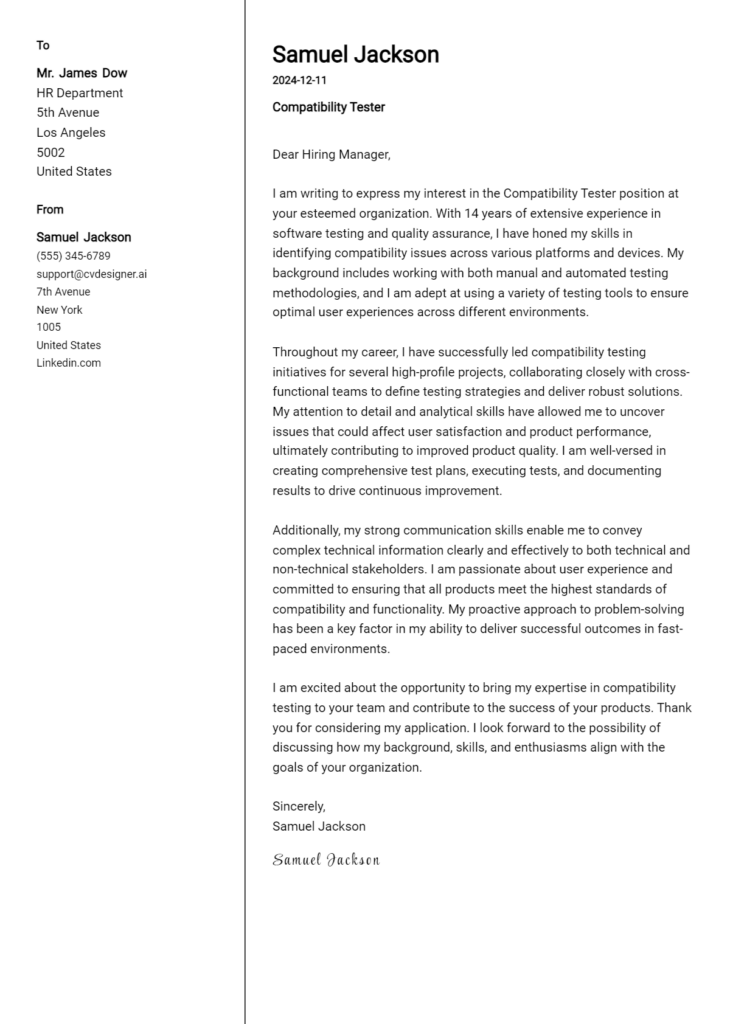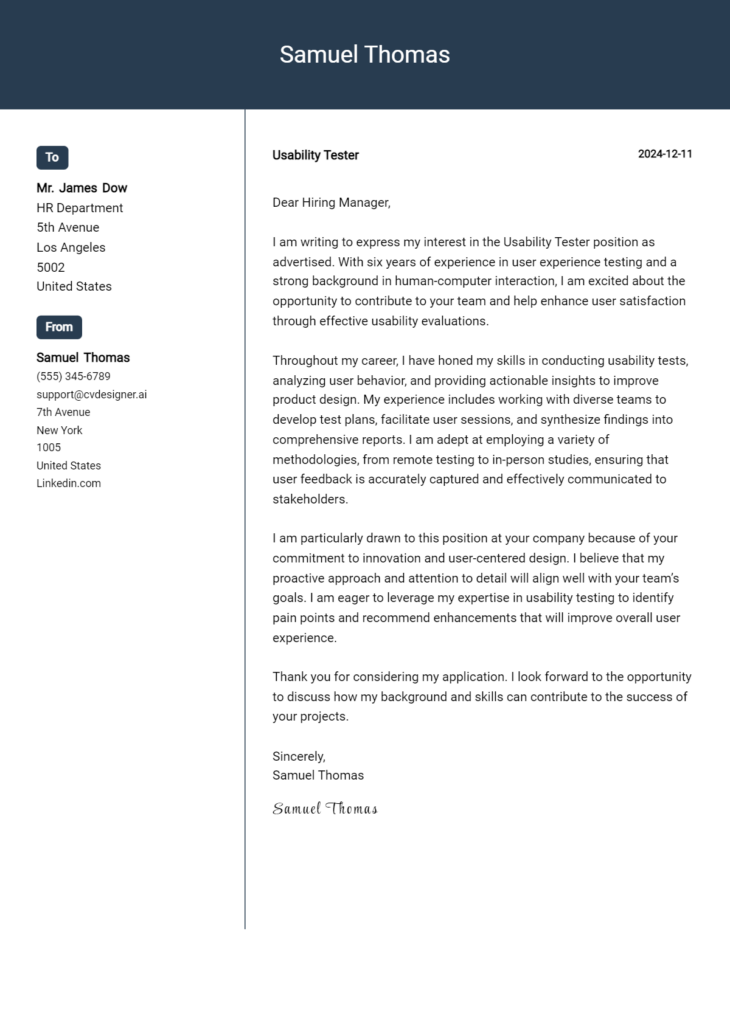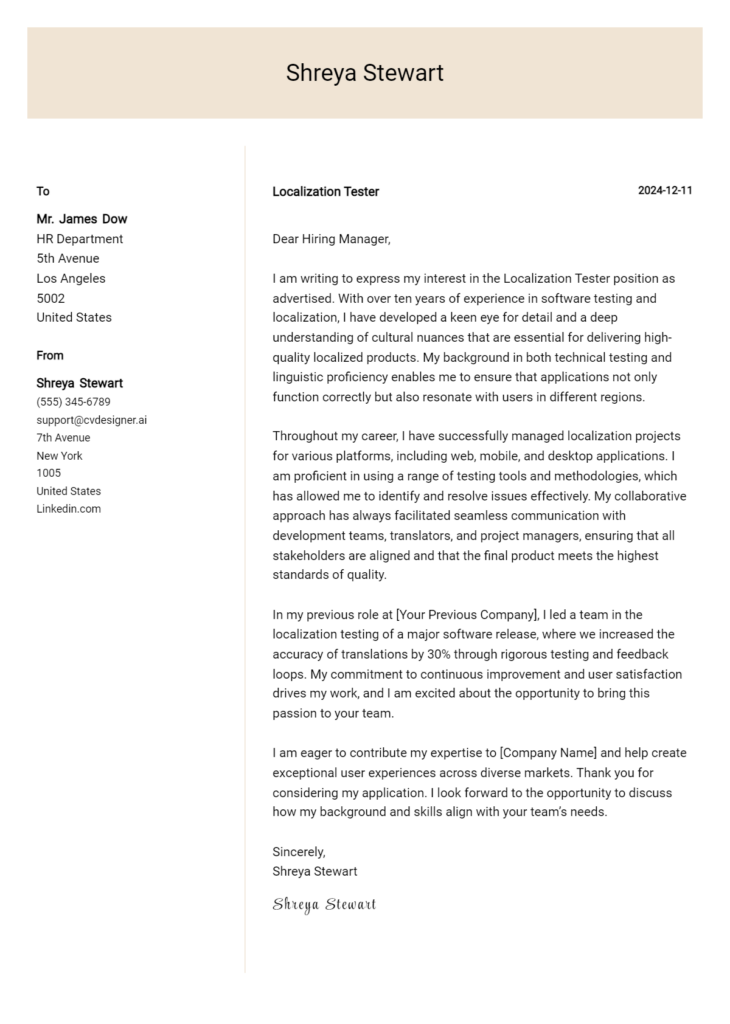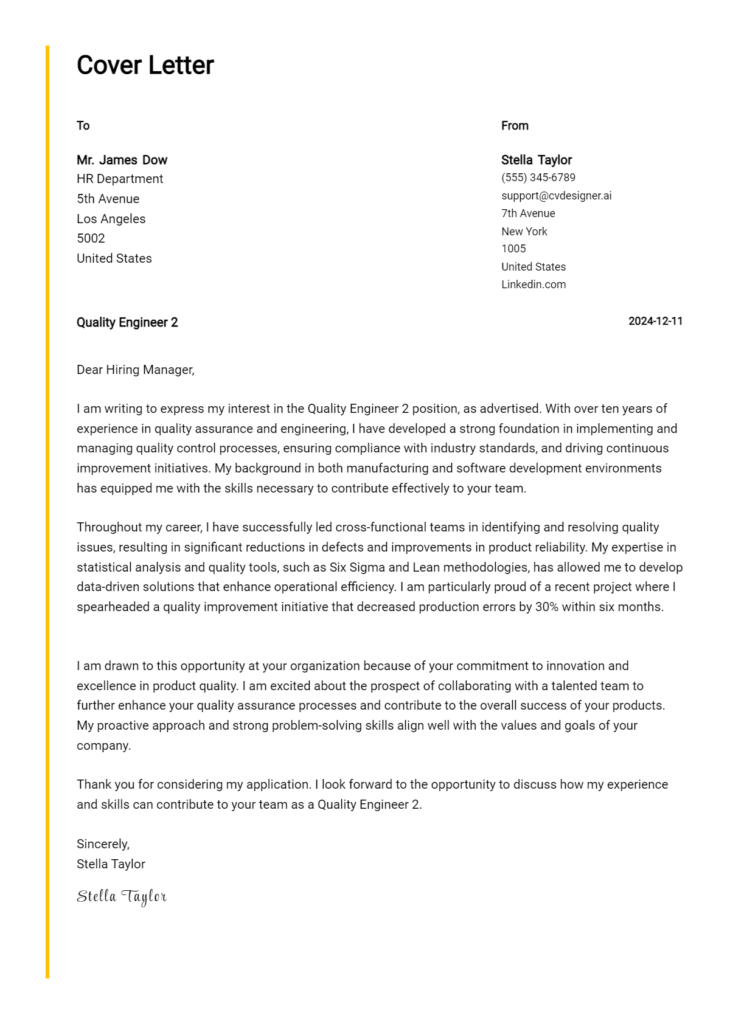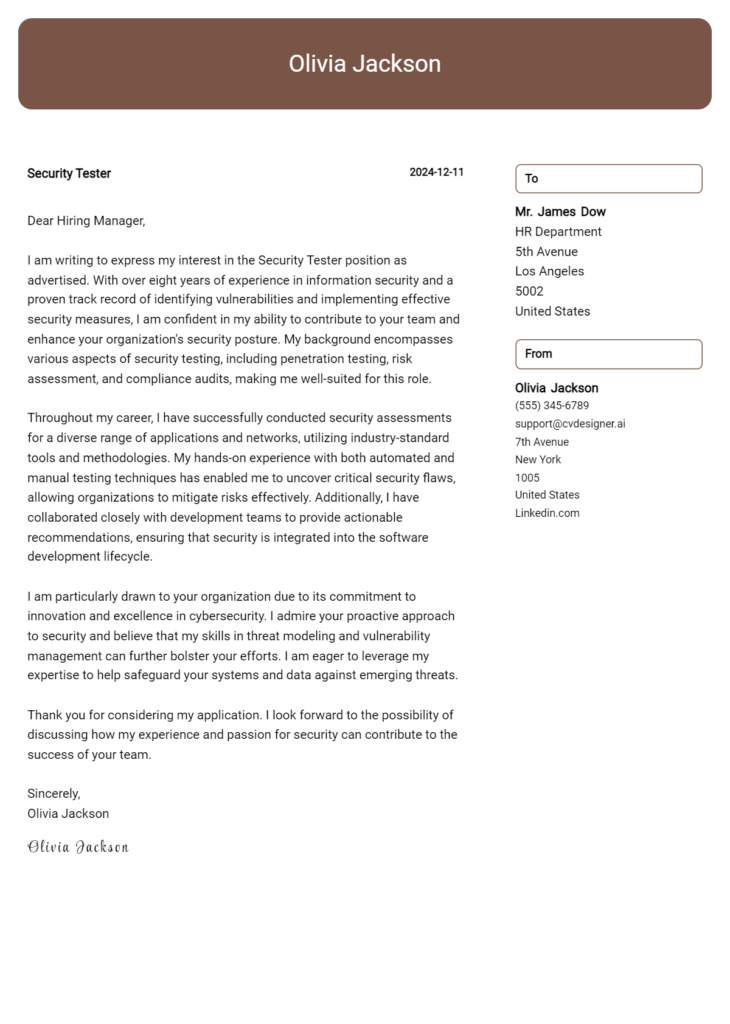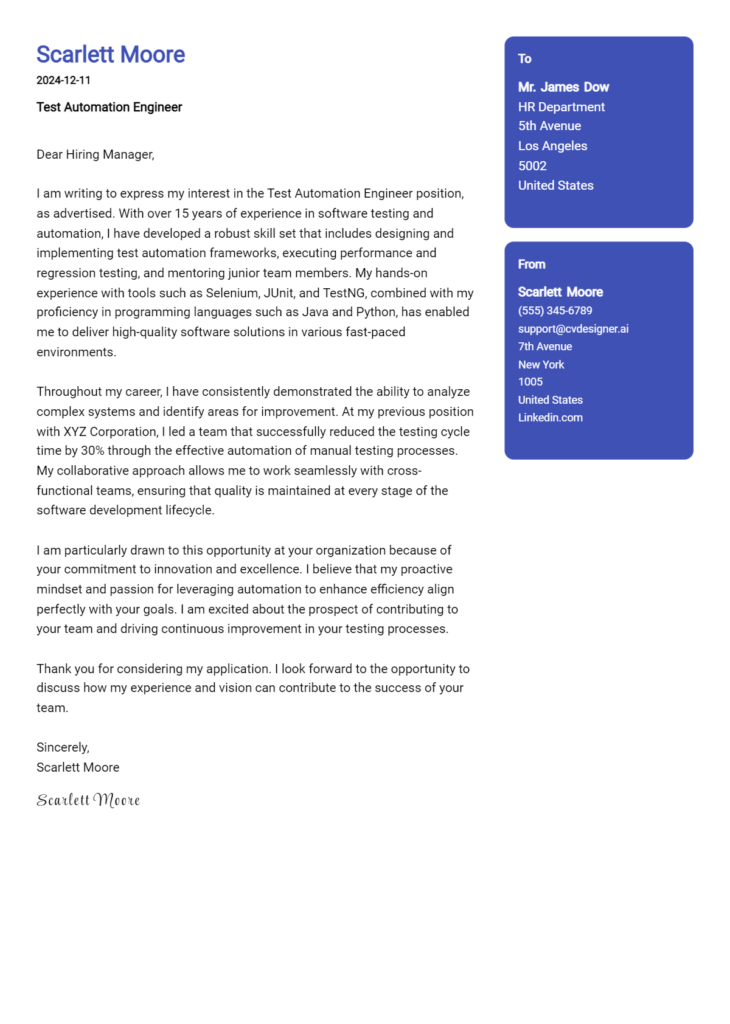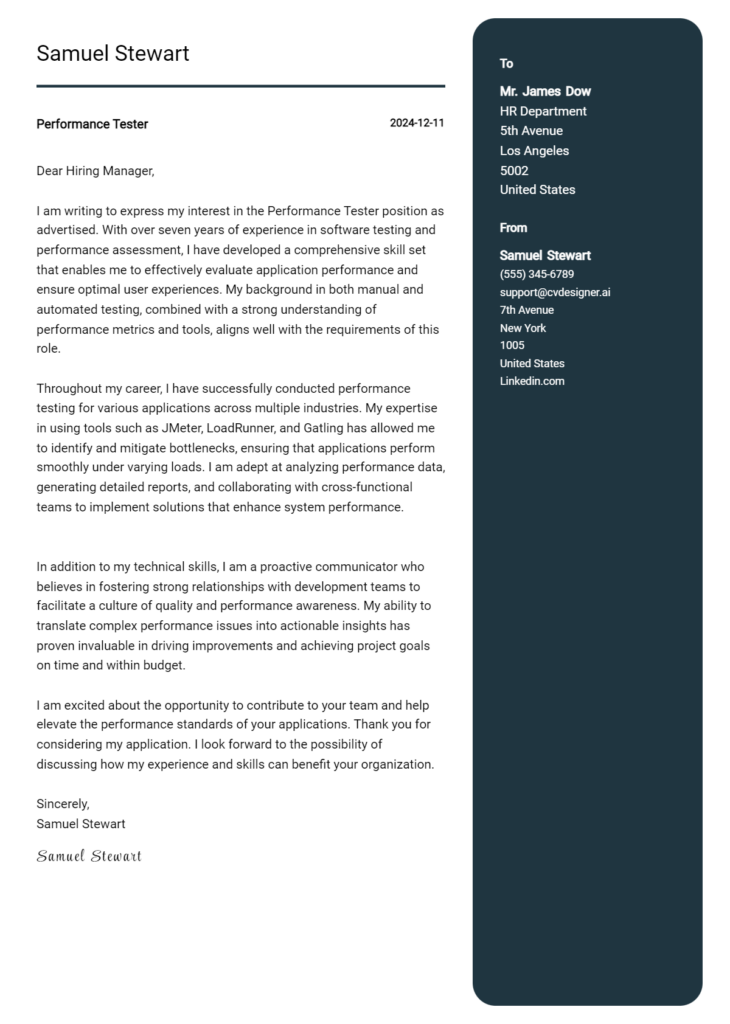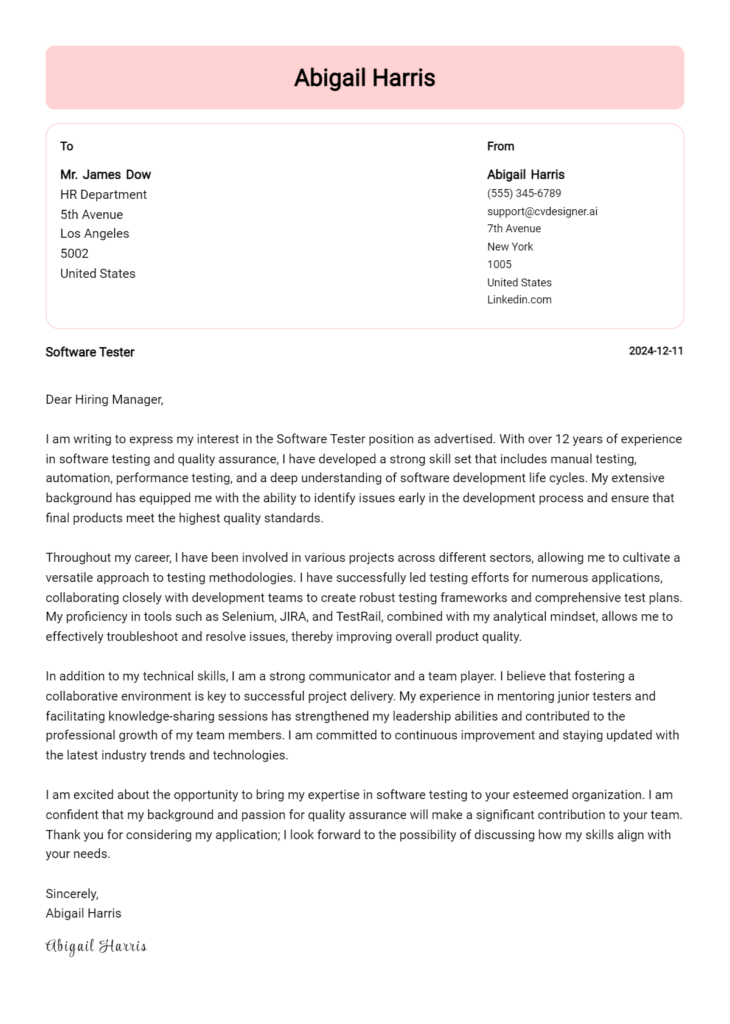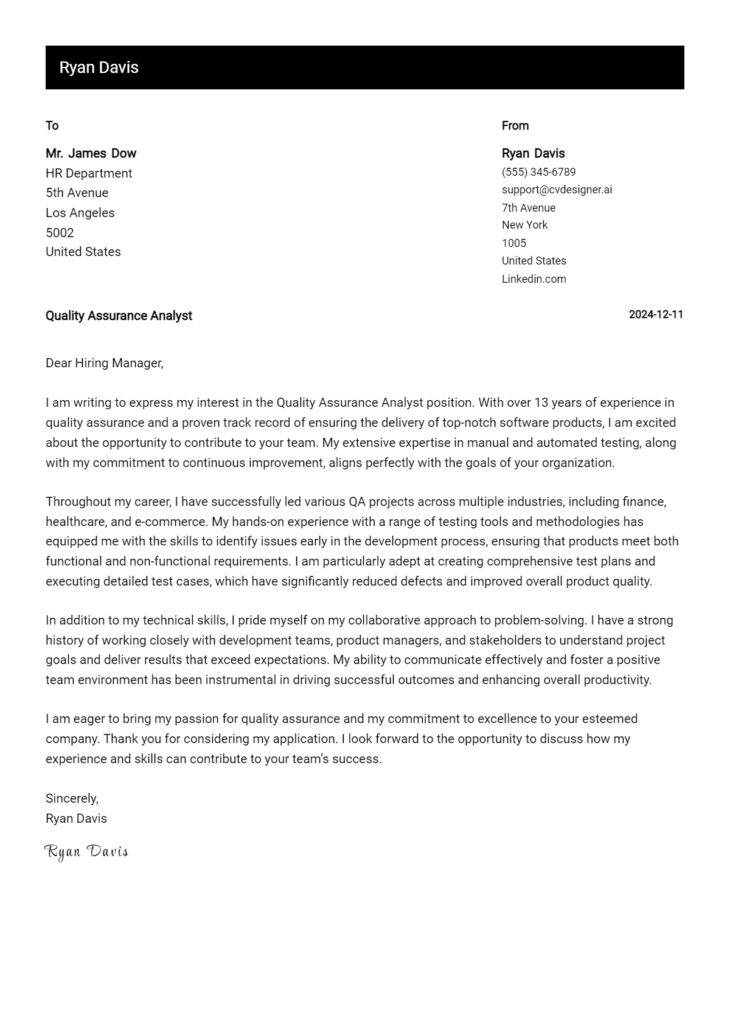Exploratory Tester Cover Letter Examples
Explore additional Exploratory Tester cover letter samples and guides and see what works for your level of experience or role.
How to Format an Exploratory Tester Cover Letter?
Crafting a compelling cover letter for an Exploratory Tester position is essential for making a strong first impression. The way you format your cover letter can significantly impact how your skills and experience are perceived by hiring managers. A well-structured cover letter not only showcases your technical abilities and problem-solving skills but also demonstrates your attention to detail and passion for quality assurance—traits that are crucial in exploratory testing.
In this guide, we will discuss how to effectively structure your cover letter, providing insights and examples tailored for the exploratory testing field.
We will focus on the essential components of a professional cover letter, including:
- Cover Letter Header
- Cover Letter Greeting
- Cover Letter Introduction
- Cover Letter Body
- Cover Letter Closing
Each section is vital in communicating your qualifications and professionalism. Let’s explore how to make your exploratory tester cover letter stand out.
Importance of the Cover Letter Header for an Exploratory Tester
The cover letter header is a crucial component of your application as an Exploratory Tester, serving as the first impression to potential employers. A well-structured header conveys professionalism and attention to detail, essential traits for a tester responsible for identifying and documenting software bugs. The header should include your contact information, the date, and the recipient's details, ensuring clarity and easy reference. A clear and professional header not only sets the tone for your letter but also makes it easier for hiring managers to connect your application with your resume. Below are examples of a strong and weak cover letter header for an Exploratory Tester.
Strong Example:
Jane Doe 123 Testing Lane Quality City, QC 12345 jane.doe@email.com (123) 456-7890 October 5, 2023 John Smith Hiring Manager Tech Solutions Inc. 456 Development Drive Innovation Town, IT 67890
Weak Example:
Jane D. 10/5/23 John S.
The Importance of a Cover Letter Greeting for an Exploratory Tester
The greeting of your cover letter is crucial in establishing a professional tone and creating a personal connection with the hiring manager. A well-crafted greeting not only demonstrates your attention to detail but also shows your enthusiasm for the position. By directly addressing the hiring manager by name, you personalize your application and convey genuine interest in the role. Avoiding generic greetings like "To whom it may concern" can set you apart from other candidates. To find the right name, consider researching the company’s website or LinkedIn profiles. This small yet significant effort can enhance your credibility and make a positive first impression.
Strong Greeting Example
Dear Ms. Johnson,
Weak Greeting Example
To whom it may concern,
The Importance of a Strong Cover Letter Introduction for an Exploratory Tester
A well-crafted cover letter introduction is crucial for an Exploratory Tester as it sets the tone for the rest of the application. The introduction should not only capture the hiring manager's attention but also express the candidate’s enthusiasm for the role and succinctly highlight relevant skills or achievements. A strong introduction can differentiate a candidate in a competitive job market, showcasing their unique qualifications and passion for quality assurance. In contrast, a weak introduction may fail to convey the candidate's value, leaving a less favorable impression. Below are examples of both strong and weak cover letter introductions for the role of an Exploratory Tester.
Strong Example:
Dear [Hiring Manager's Name], I am excited to apply for the Exploratory Tester position at [Company Name], where my passion for delivering exceptional software quality aligns perfectly with your commitment to innovation. With over five years of experience in testing diverse applications, including mobile and web platforms, I have honed my ability to uncover critical issues through meticulous exploratory testing. My recent project, where I successfully identified and resolved 30+ high-impact bugs before release, underscores my proactive approach and dedication to enhancing user experience.
Weak Example:
To whom it may concern, I am writing to apply for the Exploratory Tester job. I have some experience in testing software, and I am looking for a new opportunity. I think I could do well in this position, but I need a chance to prove myself.
Cover Letter Body for Exploratory Tester
The cover letter body for an Exploratory Tester serves as a critical opportunity to present the candidate's unique skills, experiences, and contributions to potential employers. This section should articulate how the candidate's background in exploratory testing aligns with the company's goals while also showcasing specific projects or accomplishments that demonstrate their problem-solving abilities and innovative thinking. By detailing past experiences, such as successful identification and resolution of complex bugs or the development of effective testing strategies, candidates can effectively convey their value and how they can enhance the quality assurance process within the organization.
Strong Example
Dear Hiring Manager, As an Exploratory Tester with over five years of experience in diverse software environments, I have successfully identified critical issues in high-stakes projects, including a recent e-commerce platform overhaul where my testing efforts led to a 30% reduction in post-launch defects. My hands-on approach and keen attention to detail allowed me to uncover usability issues that improved user experience ratings significantly. Additionally, I spearheaded a testing initiative that integrated exploratory techniques with automated testing, which not only increased efficiency but also enhanced the overall quality of the product. I am excited about the opportunity to bring my expertise in exploratory testing to your esteemed company and contribute to exceptional software quality.
Weak Example
Dear Hiring Manager, I have worked as a tester for a few years and have done some exploratory testing. I think my skills would be a good fit for your company. In my last job, I found some bugs, which was okay. I believe I can help your team with testing and I am interested in this position.
Importance of Cover Letter Closing for an Exploratory Tester
The closing of your cover letter is a critical component, especially for an Exploratory Tester role, as it serves to summarize your qualifications, reiterate your enthusiasm for the position, and encourage the hiring manager to take the next steps, such as reviewing your resume or scheduling an interview. A strong closing leaves a positive impression and reinforces your suitability for the role, while a weak closing may fail to convey your interest or urgency, potentially diminishing your chances of moving forward in the hiring process.
Strong Example
Thank you for considering my application for the Exploratory Tester position. With my extensive experience in software testing, my keen attention to detail, and my passion for delivering high-quality products, I am excited about the opportunity to contribute to your team. I would love the chance to discuss how my skills can benefit your company further. Please feel free to reach out to schedule an interview, and I look forward to the possibility of working together.
Weak Example
Thanks for reading my letter. I hope you think I’m a good candidate. If you want to look at my resume, it’s attached. I guess you can call me if you want to talk more.
Crafting an effective cover letter is crucial for candidates applying for the role of an Exploratory Tester. Your cover letter is an opportunity to showcase your unique skills and experiences that set you apart from other applicants. It’s important to highlight your technical skills, problem-solving abilities, knowledge of the Software Development Life Cycle (SDLC), teamwork capabilities, and a genuine passion for continuous learning. The following tips will guide you in writing a compelling cover letter that captures the attention of potential employers.
Tips for Crafting Your Exploratory Tester Cover Letter
Highlight Your Technical Skills: Start by clearly stating your technical proficiencies relevant to exploratory testing. Mention specific tools and technologies you are proficient in, such as Selenium, JIRA, or Postman. Providing concrete examples of how you used these tools in past projects can help demonstrate your capabilities.
Demonstrate Problem-Solving Abilities: Exploratory testing often requires quick thinking and creative problem-solving. Share a brief story or example of a challenging testing scenario you encountered and how you approached it. This not only showcases your critical thinking but also your resilience and adaptability.
Show Your Understanding of SDLC: Employers appreciate candidates who understand the Software Development Life Cycle. Discuss your experience working at different stages of the SDLC, emphasizing how your testing efforts contributed to the overall quality and success of the project. This shows that you are not only familiar with testing but also understand its context within the larger development process.
Emphasize Teamwork and Collaboration: Exploratory testers often work closely with developers, product managers, and other stakeholders. Highlight specific instances where you successfully collaborated with others to improve product quality. Mention any agile practices you have adopted and how they facilitated teamwork and communication within the project.
Express a Passion for Continuous Learning: The tech industry is ever-evolving, and a strong candidate for an exploratory testing role should be committed to staying updated with the latest trends and technologies. Mention any relevant certifications, courses, or personal projects that reflect your dedication to professional growth. This demonstrates your proactive attitude and eagerness to contribute effectively to the team.
By following these tips, you can create a strong cover letter that not only reflects your qualifications but also your enthusiasm for the role. For further assistance, consider exploring cover letter templates or using a cover letter builder to help you structure your letter effectively.
Common Mistakes to Avoid in a Exploratory Tester Cover Letter
Crafting a compelling cover letter is essential for standing out in the competitive field of exploratory testing. Avoiding common mistakes can significantly enhance your chances of landing an interview. Here are some pitfalls to steer clear of:
- Generic Content: Using a one-size-fits-all approach can make your cover letter forgettable. Tailor your letter to the specific job and company.
- Lack of Specific Examples: Failing to provide concrete examples of your exploratory testing skills can weaken your application. Illustrate your problem-solving abilities with real-life scenarios.
- Ignoring Formatting Guidelines: Neglecting the proper cover letter format can make your letter look unprofessional. Follow standard formatting to ensure clarity and readability.
- Focusing Solely on Responsibilities: Listing past job duties without highlighting achievements can be a missed opportunity. Emphasize how you added value in previous roles.
- Spelling and Grammar Errors: Mistakes in your cover letter can reflect poorly on your attention to detail. Proofread thoroughly and consider using tools to catch errors.
- Being Too Formal or Casual: Striking the right tone is critical. Aim for professionalism while letting your personality shine through.
- Neglecting the Closing: A weak or vague closing can diminish the impact of your cover letter. End with a strong statement that reiterates your enthusiasm and invites the reader to discuss further.
By steering clear of these common mistakes, you can create a cover letter that effectively showcases your skills as an exploratory tester. For inspiration, check out various cover letter examples that highlight successful approaches.
Cover Letter FAQs for Exploratory Tester
What should I include in my cover letter as an Exploratory Tester?
In your cover letter, highlight your experience in exploratory testing and your familiarity with various testing methodologies. Discuss specific tools and technologies you've used, such as Selenium, JIRA, or TestRail, and how they contributed to your testing processes. Include examples of projects where your exploratory testing skills uncovered critical bugs or improved product quality. Additionally, express your passion for software quality and your ability to think critically and creatively when approaching testing challenges. Tailor your letter to the job description, emphasizing how your skills meet the requirements of the role.
How do I showcase my problem-solving skills in my cover letter?
To effectively showcase your problem-solving skills, include specific examples of challenges you've faced in previous roles and how you addressed them through exploratory testing. Describe situations where your analytical abilities led to discovering issues that automated tests might have missed. You can mention a particular bug you identified during a testing session and explain how your investigations led to a resolution. Highlight your ability to think outside the box, adapt to changing requirements, and collaborate with developers to ensure high-quality software delivery. Use measurable outcomes to demonstrate the impact of your problem-solving skills.
Should I mention my certifications in my cover letter?
Yes, mentioning relevant certifications in your cover letter can enhance your credibility as an Exploratory Tester. Certifications like ISTQB or CSTE demonstrate your commitment to the field and understanding of testing principles. Include these certifications in the context of your experience, explaining how they have equipped you with the skills necessary for the role. For example, you might say, "My ISTQB certification has provided me with a solid foundation in testing principles, which I applied effectively in several exploratory testing projects." This shows potential employers that you have both practical experience and theoretical knowledge.
How can I make my cover letter stand out?
To make your cover letter stand out, personalize it for the company and role you are applying for. Research the company’s products and testing culture, and reference them in your letter. Use a compelling opening statement that captures the reader's attention and conveys your enthusiasm for the role. Incorporate keywords from the job description to align your skills with their needs. Additionally, consider sharing a unique story or experience from your career that showcases your passion for exploratory testing. Finally, keep your tone professional yet approachable to create a genuine connection with the reader.
Build your Cover Letter in minutes
Use an AI-powered cover letter builder and have your letter done in 5 minutes. Just select your template and our software will guide you through the process.

